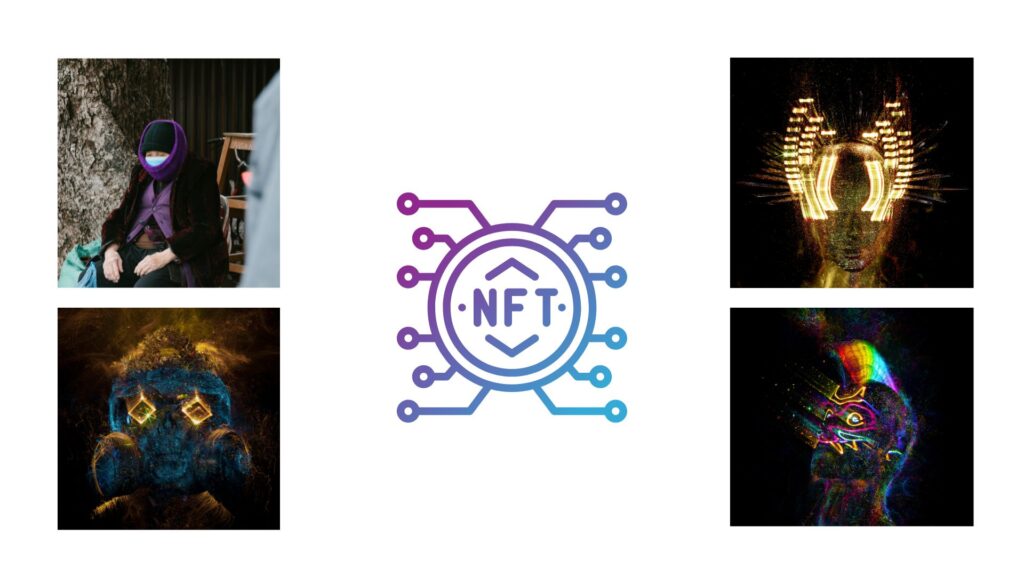What are NFTs?
NFT, or “non-fungible token,” is a term. In its most basic form, it is a type of digital asset. It connects ownership to certain physical or digital assets like artwork, real estate, or music.
NFTs are regarded as contemporary collectibles and digital proof of ownership for a particular item. They can be purchased and sold online. The uniqueness of the asset is guaranteed by the secure recording on a blockchain, which is the same technology used to power cryptocurrencies. It may also be challenging to modify or counterfeit them due to the technology.
In order to understand them better, it is important to understand their economic fungibility.
Firstly, we try to understand the economic concept of the fungibility of items:
Fungible item
Because their value is independent of their rarity, fungible items can be swapped easily. For instance, even though your new bill has a different serial number, you can swap a $1 bill for another $1 and keep your $1.
Non-fungible item
Items that are non-fungible cannot be exchanged. Each token has a different value from tokens that are comparable to it and has its own special characteristics.
How do NFTs work?
NFTs are stored on a blockchain, a public database for recording transactions that is decentralized. The technology that enables cryptocurrency.
As the name suggests, a “blockchain” is a series of blocks or sets of transactions that have been dispersed among users.
Blockchain works as an immutable record of transactions that do not need the approval of a third party to ensure their legitimacy or integrity. Despite the fact that financial transactions predominate, the blocks can hold any kind of data, including NFTs.

The NFT is made up of digital objects that represent various things, such as:
- Skins for video games and virtual characters made of art
- Collectibles
- Memes
- ID files, music coupons, and medical information
How can NFTs help your business?
Businesses have opportunities to create new revenue streams from these tokens. They have also developed into a desirable investment source, making it possible to finance new businesses.
Businesses, especially those with media and entertainment assets tend to benefit more from the tokens. They should work on strategies to leverage them. A few ways that NFTs can help businesses include:
Investment
NFT has the potential to be a successful investment to be used by businesses and startups for investment objectives. Businesses invest in NFTs because they think the digital world is the future.
You must their trends and sell them at the right time if you want to optimize your return on investment. In order to optimize your profit given how quickly NFTs’ values fluctuate, it’s a good idea to set aside time each day to check on the value.
Customer Loyalty
Customers can be rewarded for being loyal and they have an opportunity to earn money. They can be issued with a loyalty card. his could encourage them to use your services more. Other rewards include discounts through membership programs.
Customers can download membership programs to their mobile and accrue loyalty points. When certain levels are reached, you can force rewards, discounts, or blockchain tokens that can be utilized in stores.

Gaming
NFT can be used successfully in the gaming sector. It will enable gamers to trade virtual goods as they play games. Gamers may monetize their gaming assets and experiences using this platform. The platform may let users use NFT to develop their own games.
They can realize a profit in the gaming industry and form partnerships with independent blockchain projects to realize their goals.
Widespread acceptance of gaming apps will encourage further NFT infrastructure enhancements and the development of fresh, all-encompassing solutions.
Brand visibility
NFTs offer a different means for companies and enterprises to promote their brands in addition to digital marketing. A digital version of your items, for instance, exposes them to NFT fans, some of whom may not be familiar with your products. NFTs can also be included in your brand storytelling to give customers distinctive experiences and hence boost consumer engagement.
Authenticity
Due to scams, many businesses experience revenue losses. Businesses can determine the authenticity of their goods and services using NFTs. Every transaction generates a digital certificate, and a record is stored on the blockchain. Since the blockchain may be used to identify the original vendor, the client can verify the validity.
Conclusion
NFTs are tokens on the blockchain that have special identification codes. These tokens are typically attached to a physical object. Anyone who holds the object with the token is deemed to be the item’s owner, regardless of the number of duplicates that are available.
NFTs have the ability to make you millions of dollars as an investor. You can acquire them for a low cost and then sell them higher if demand rises. Don’t expect to start making money right away. Some NFTs may not appreciate if there is little demand. In order to invest effectively and earn the most money, it is crucial for you to perform a study.


